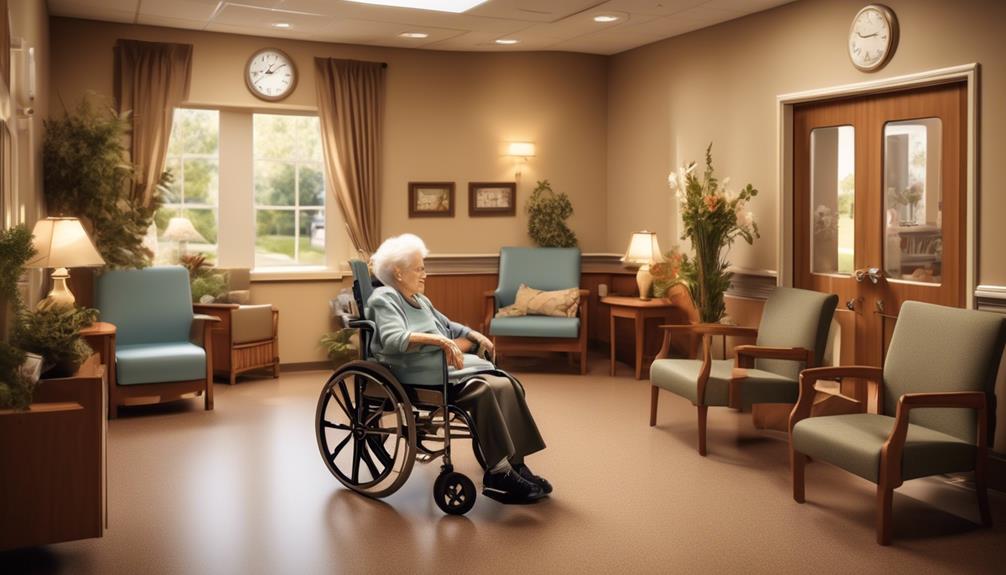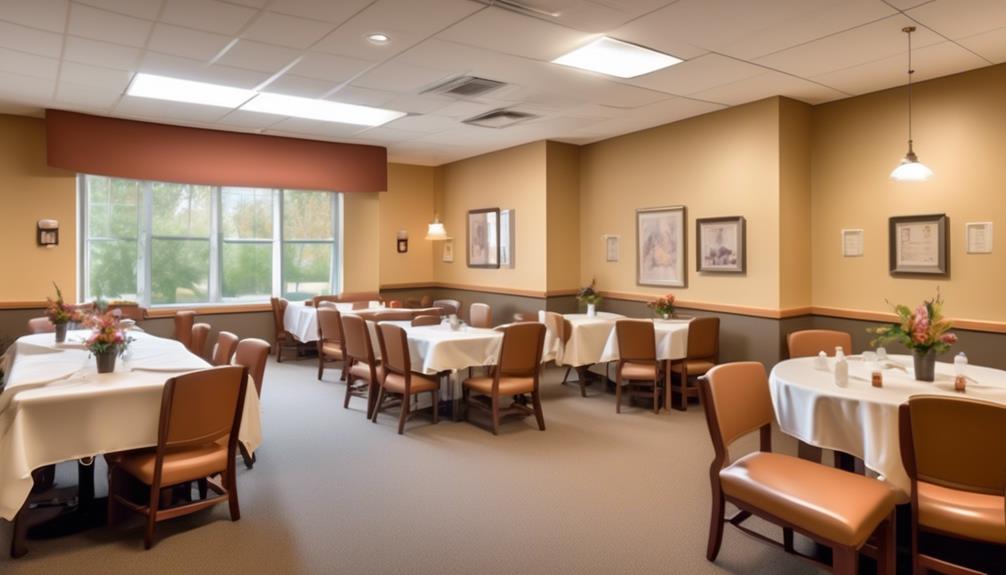Think of elderly respite care as a peaceful oasis in the midst of the challenging responsibilities of caregiving, providing a moment of rest and revitalization along the demanding journey.
But what exactly does this entail for caregivers and their loved ones?
Let's unravel the layers of respite care services and explore the intricate web of support that can provide much-needed assistance and comfort in times of need.
Key Takeaways
- Respite care offers temporary relief for primary caregivers of elderly individuals.
- Various forms of respite services cater to specific caregiver and senior needs.
- Funding options like health insurance and Medicare can support respite care costs.
- Respite care enhances well-being, reduces stress, and improves quality of life.
Definition of Respite Care
Respite care offers essential temporary relief to us, the primary caregivers of elderly individuals, allowing us to take well-deserved breaks from our caregiving duties. As caregivers, we devote our time to providing care for our loved ones, but it's crucial to remember that we also need care and support. Respite services come in various forms, such as at-home care, day-care centers, or residential facilities, giving us the flexibility to find respite care that best suits our needs and those of our family members.
When we feel overwhelmed or simply need some time to recharge, respite care steps in to provide the assistance required. It isn't just about a physical break but also about nurturing our mental and emotional well-being. By utilizing respite services, we can ensure that we continue to provide the best possible care while preventing burnout and reducing stress. Finding respite care allows us to strike a balance between caring for our loved ones and taking care of ourselves, fostering a healthier caregiving environment for all involved.
Benefits for Caregivers and Seniors

Understanding the challenges faced by caregivers and seniors is crucial in appreciating the significant benefits that respite care can offer in enhancing overall well-being and quality of life. Caregiving for elderly loved ones can be physically and emotionally demanding, often leading to burnout and increased stress levels. Respite care provides caregivers with temporary relief, allowing them the opportunity to take a break, recharge, and prioritize self-care. This temporary support not only benefits the caregivers' own well-being but also enhances the quality of care they provide to seniors.
For seniors, respite care offers a chance to socialize, engage in activities, and receive personalized attention from trained professionals. It provides them with additional support and companionship, contributing to their overall happiness and mental health. By exploring different respite care options such as home-based care, adult day care centers, or residential facilities, caregivers can tailor the support to meet the specific needs of their elderly loved ones. Ultimately, respite care serves as a vital resource in ensuring both caregivers and seniors receive the necessary relief, support, and care to lead fulfilling lives.
Types of Respite Care Services
Exploring the various options available, we can discover different types of respite care services designed to provide temporary relief and support for both caregivers and seniors. Here are the types of respite care services that can be found to help meet the needs of your loved ones:
- In-Home Respite Care: This type of respite care is provided in the comfort of the senior's home, offering assistance ranging from a few hours to overnight stays, tailored to the specific requirements of the senior.
- Adult Day Care Centers: These centers offer respite care services during daytime hours, providing activities, socialization, and supervision for seniors while giving family caregivers the time they need to attend to other responsibilities.
- Residential Facilities: Some respite care programs take place in residential facilities that cater to seniors, adults, and children, offering 24-hour caregiver relief and support in a safe environment.
- Combined Support Services: Certain respite care programs integrate support services, educational opportunities, and peer interactions, enhancing the overall caregiving experience for seniors and their caregivers.
Considerations for Choosing Respite Care

Considering the well-being of both caregivers and seniors is paramount when selecting the most suitable respite care option. When choosing respite care, it is crucial to take into account various factors to ensure a positive experience for all involved. Below is a table outlining essential considerations for selecting respite care:
| Consideration | Description | Example |
|---|---|---|
| Location of Respite Care | Determine if care will be provided at home, in day-care centers, or residential facilities. | Opting for home care services for a familiar environment. |
| Types of Respite Services | Explore in-home care, out-of-home programs, and the range of services from personal to skilled health care. | Utilizing an assisted living facility for comprehensive care. |
| Funding Options | Assess available funding options such as health insurance coverage or support from veterans programs. | Exploring financial aid through the ARCH National Respite Network. |
Resources for Respite Care Information
In our search for valuable information on respite care resources, we explore the support provided by the ARCH National Respite Locator Service. When looking for respite care options, it's essential to consider various resources that can guide you in making informed decisions. Here are some key points to keep in mind:
- State-Sponsored Programs: These programs offer respite care services tailored to the needs of elderly individuals and their caregivers, providing essential support and relief.
- Adult Day Care Centers: These centers can be valuable resources for respite care, offering a safe and engaging environment for seniors while their family members take a break.
- Medicare Coverage: Medicare often covers most costs associated with respite care for individuals receiving hospice care, easing financial burdens for families during challenging times.
- Private Health Insurance Plans: While Medicare may cover certain aspects of respite care, it's important to note that private health insurance plans typically don't cover these costs, prompting the need to explore alternative funding options.
Frequently Asked Questions
What Are the Disadvantages of Respite Care?
Disadvantages of respite care can include feelings of guilt and anxiety for caregivers, as they worry about the quality of care provided in their absence. Care recipients may experience confusion or distress transitioning to new caregivers. Challenges in finding suitable providers, especially for specialized care needs, can arise. Financial costs may limit access to respite services. Inconsistent schedules or limited availability can add stress and uncertainty to caregivers' responsibilities.
These factors can create additional burdens for both caregivers and care recipients, highlighting the importance of addressing these challenges to ensure the well-being of all involved.
Who Is Respite Care Best Suited For?
Respite care is best suited for family caregivers who need a temporary break from their caregiving duties. We understand the importance of taking care of oneself to provide the best care for our elderly loved ones.
It's ideal for those experiencing burnout, stress, or feeling overwhelmed. Respite care allows us to recharge, prevent caregiver fatigue, and ensure our loved ones receive continuous support.
It's a vital resource for those seeking short-term relief while prioritizing their own well-being.
What Does It Mean When Someone Is in Respite Care?
When someone is in respite care, they're receiving temporary relief from their primary caregiver. During this time, trained professionals or volunteers are providing care and support to the individual.
This allows the primary caregiver to take a break and attend to their own needs. Respite care is a vital service that ensures both the caregiver and the elderly individual are well-supported and cared for.
Is Respite Care the Same as Hospice?
Respite care and hospice care serve different purposes.
While respite care offers temporary relief to caregivers, hospice care focuses on end-of-life comfort.
Respite care provides breaks for caregivers, whereas hospice care enhances quality of life during terminal illness stages.
Understanding these distinctions ensures appropriate support for elderly individuals and caregivers.
Conclusion
In conclusion, respite care for the elderly is a valuable resource for both caregivers and seniors, offering much-needed relief and support. It allows caregivers to take a break and recharge, while ensuring that their loved ones receive quality care.
Remember, taking care of yourself is just as important as taking care of others. So, don't hesitate to explore respite care options and give yourself the break you deserve. After all, a happy caregiver leads to a happier senior.









